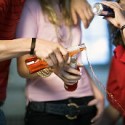U study: Too many troops tie one on
Binge drinking in the military is more common than you may think, university study finds.
It may come as no surprise to anyone who’s served in the military, but 43 percent of active-duty personnel admit to frequent binge drinking, according to a new study from the University of Minnesota.
On average, that means that every soldier, sailor and Marine is drinking more than four or five alcoholic drinks at one sitting about 30 times a year, the researchers found.
The numbers are based on a 2005 survey of 16,037 active-duty military personnel by the Department of Defense.
Previous studies have found similar rates of binge drinking — not only among military men and women, but among college students as well.
But Mandy Stahre, a doctoral candidate at the university’s School of Public Health, said she and her fellow researchers were surprised at the frequency of binge drinking, especially among those younger than the legal drinking age of 21.
In the survey, 44 percent of those ages 17 to 20 reported binge drinking in the previous 30 days. By definition, that means four or more drinks in one sitting for women, and five or more for men.
“The problem of binge drinking is not new in the military,” Stahre said. “What’s startling was definitely the number of incidents per person per year. There’s 52 weeks in a year; 30 of those weeks they’re binge drinking at least once.”
Stahre found similar rates in a 2002 Defense Department survey.
By comparison, 40 percent of college students admitted to binge drinking in a 2006 University of Michigan survey.
Stahre said the new report suggests that the military could do more to try to prevent the problem.
Last fall, the Defense Department launched a campaign to try to curb excessive drinking among 18- to 24-year-olds. It reported that 56 percent of those “junior” enlisted men and women were binge drinkers.
source: Star Tribune
